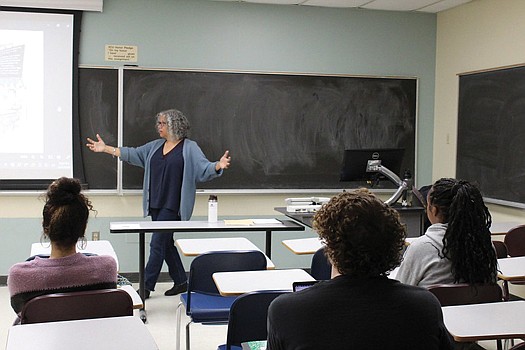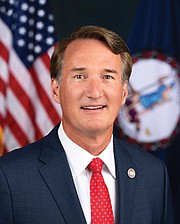Gov. Youngkin requests to review course syllabi at two Virginia universities
Andrew Kerley/Capital News Service | 3/28/2024, 6 p.m.

Gov. Glenn Youngkin recently requested syllabi from two state universities, a move some faculty called “unprecedented” and reflective of a national trend to challenge academic freedom. Some appointed Board of Visitors members also have questioned mandates for students to take general education courses on diversity and racial literacy.
Gov. Youngkin wanted to review syllabi of courses that fulfill George Mason University’s upcoming Just Societies core curriculum requirement and Virginia Commonwealth University’s racial literacy requirement.
Christian Martinez, Gov. Youngkin’s spokesperson, called the curriculum mandates a “thinly veiled attempt to incorporate the progressive left’s groupthink on Virginia’s students,” in a statement released to several news organizations. Mr. Martinez did not respond to phone, email and text message interview requests from Capital News Service.
Just Societies at GMU
Development of the GMU Just Societies requirement began in 2018, was approved by the Faculty Senate and presented to the Board of Visitors in 2022, according to testimony shared during a February Board of Visitors meeting.
GMU students who begin enrollment in fall 2024 will be required to choose two courses from an approved list. The courses teach diversity, equity and inclusion-related content. Many of the courses are not new, but the learning objectives were updated.
The university created the core requirement to meet accreditation standards, student needs and employer preferences, the senior associate provost for undergraduate education told the Board in February.
The Just Societies framework also helps the university better align with its peer institutions, who all offer similar courses, he said.
Approximately 40 people commented on the new requirement during the meeting, both for and against it. Comments ranged from calling the requirement “anything but just” and “anti-intellectual” to saying it was “key” to learning new perspectives, critical thinking and analytical skill sets.
Gov. Youngkin-appointed Board members questioned the requirement’s necessity during the meeting, with one saying he was “at a loss for how this should be mandatory.” They also asked if the requirement could be delayed while it was discussed and reviewed.
Rector Horace Blackman told the Board the requirement had previous approval and did not come out of “thin air.” He said it was important to get it right, and asked the committee to look at it again and have a discussion in May.
The GMU branch of the American Association for University Professors released a petition asking the Board to stop its 11th-hour inquiry, calling it an overreach of governance powers.
GMU did not respond to multiple requests for comment.
Racial literacy at VCU
Meanwhile, VCU faculty and students have fought for multiple years to instate a racial literacy core curriculum requirement.
Youngkin’s secretary of education requested to view syllabi for the courses last month. The provost shared 11 syllabi, for classes that “promote intellectual diversity and foster intellectual inquiry.” VCU spokesperson Michael Porter confirmed the syllabi were sent, and did not provide further comment.
The VCU Board of Visitors asked during a March 22 meeting for a future presentation on the requirement, according to the provost.
Virginia schools are typically given the space to operate quasi-independently, unlike other state-wide systems, according to Bob Spieldenner, spokesperson for the State Council of Higher Education for Virginia.
Lawmakers can, however, influence decisions through funding and Board appointments. Gov. Youngkin appointees will hold the majority of VCU Board of Visitors seats starting in July.
A sitting governor does not usually review college curriculums, according to VCU assistant professor Kristin Reed.
She has taught at VCU since 2009 and is a member of the United Campus Workers of Virginia at VCU.
The union called the syllabi request unprecedented and “a form of attack on academic freedom and the First Amendment right to free speech on our college campuses,” in a statement released March 11. The review of college-level curriculum also “coincides with a national strategy to silence the teaching of racial justice and social inequalities,” the union stated.
“We have political officials who are kind of going outside the scope of their work, to launch what is basically a political attack,” Dr. Reed said. “Not conducting business as usual, but working specifically to advance political objectives.”
Ana Edwards is a member of the subcommittee working to develop the required curriculum. She also coordinates CSIJ 200: Introduction to Race and Racism, one of two courses already being taught, but not as a requirement.
“The development of this curriculum, by some folks, has been described as politicizing education,” Ms. Edwards said. “The truth is that they have politicized it by constantly bringing it up for scrutiny, as if it had not gone through all of the proper channels and procedures that the university has in place.”
Direct student involvement with the curriculum’s creation and development shows students see it as important to their education, according to Ms. Edwards.
The idea has gone through several phases and hit several roadblocks. It first began in 2020 as a student-led effort. VCU administrators delayed the requirement’s implementation weeks before it launched.
The provost cited a lack of courses and sections to seat what would be VCU’s largest class ever. Some students and faculty did not believe the reasoning, according to the university’s student newspaper The Commonwealth Times.
Faculty will continue the process to implement the curriculum in the fall, despite the governor’s request for review, Ms. Edwards said.
“Having sort of observed all of the protocols, there isn’t any reason why this should be stopped suddenly, simply because the governor’s office decides to take a look at the courses,” Ms. Edwards said.
Faculty spoke out against the governor’s requests during the March 22 Board meeting. Education professor Gabriel Reich, Ph.D. said academic freedom in Virginia, and around the country, is being threatened.
“Truth does not have a political party, nor should it be subjected to orthodoxy; it emerges from the free exchange between scholars, students and members of the public,” Dr. Reich said. He hopes Virginia will “steer the wiser course.”
“The public nature of this request, at a time when academic freedom is under attack, was calculated to instill fear, and fear is the enemy of truth,” Dr. Reich said.
Emily Richardson contributed to this article. Capital News Service is a program of Virginia Commonwealth University’s Robertson School of Media and Culture. Students in the program provide state government coverage for various media outlets in Virginia.







